BUT WILL HE RECEIVE A FAIR REVIEW?
by Sharon Rondeau
 (Jan. 31, 2019) — On November 15, 2018, The Post & Email published an article detailing a 22+-year effort on the part of Memphis resident Earley Story to clear his name of a felony of which he was convicted in December 1999.
(Jan. 31, 2019) — On November 15, 2018, The Post & Email published an article detailing a 22+-year effort on the part of Memphis resident Earley Story to clear his name of a felony of which he was convicted in December 1999.
The 1997 charge for allegedly selling marijuana to an undercover agent occurred after Story became a whistleblower on conditions in the Shelby County jail, where he worked while employed with the Shelby County Sheriff’s Office (SCSO).
Shelby County comprises Tennessee’s 30th Judicial District.
In 2000, the U.S. Justice Department launched an investigation into the jail after a federal judge ruled numerous aspects of its operation unconstitutional. In its findings report, the Justice Department documented excessive use of force; inadequate mental-health and medical care; a lack of disciplinary procedures; security concerns; and incomplete intake evaluations.
In his initial interview with this publication in November, Story described instances in which inmates were seriously injured, with at least one losing his life as a result. Story subsequently reported the jail conditions to the FBI, the NAACP, and the federal court for the Western District of Tennessee, actions which he said he believes led to his false arrest in 1997.

As have many others, Story described widespread corruption in the prosecutor’s office dating back to the 1990s resulting in his arrest and eventual conviction, which he said immeasurably damaged his ability to secure full-time employment afterward. More recent complaints have come from current Shelby County jail inmates who say that District Attorney General Amy Weirich and her assistants prosecute individuals without evidence amid an apparent zeal to obtain as many convictions as possible.
In October, Story told us, “I was framed on false drug selling charges for doing my job. Connections with the DA and the courts have allowed this systemic activity to be ongoing.”
At the time of Story’s arrest, the District Attorney General was William L. Gibbons. A summary of the case and Story’s appeal at courtlistener.com states that two additional dates on which Story allegedly sold marijuana to “cooperating individual” Alfredo Shaw and “undercover narcotics agent” Jeffrey Butler were not found credible by the trial jury. As related in the summary, Story told us in November that one of his original trial attorneys was the late Rebecca Coffee, wife of Shelby County Criminal Court Judge Lee Coffee, about whom this publication has reported previously.
At the time Ms. Coffee represented Story, her husband was a Shelby County assistant district attorney general.
A Stipulation of Facts establishes the three dates alleged by Shelby County that Story attempted to sell the marijuana to Shaw.

Despite a finding that “the trial court erred” on a point Story asked it to consider, the appellate court upheld the lower court’s decision, stating that “the errors were harmless.”
In March 2017, Weirich was given a “private reprimand” for her courtroom conduct in the high-profile Noura Jackson case which saw Jackson imprisoned for 11 years for the murder of her mother after potentially exculpatory evidence was withheld by one of Weirich’s deputies. In 2014, the Tennessee Supreme Court reversed Jackson’s conviction, although not ending her entanglement in Shelby County’s legal system.
A 2017 study conducted by the Fair Punishment Project revealed Weirich as the most frequently-cited prosecutor in Tennessee for “misconduct” and “reversal” as well as “prosecutorial misconduct” among the states of Tennessee, Louisiana, Missouri and California between 2010 and 2015.
In 2014, Weirich was elected to an eight-year term and is expected to seek re-election in 2022.
Story told The Post & Email on Tuesday that he recently received exculpatory documentation in his 22-year-old case provided to him by a death row inmate, Tony Carruthers. The document, Story said, demonstrates that confidential informant Alfredo Shaw, who later testified about Story’s alleged drug-dealing on January 22, 1997, was not telling the truth.
“They convicted me of committing a crime on January 22, 1997, but the evidence Debbie Fessenden, the county attorney, sent to Tony Carruthers’s federal defender’s office is a redacted form which shows that nothing happened with the confidential informant on January 22,” Story said.
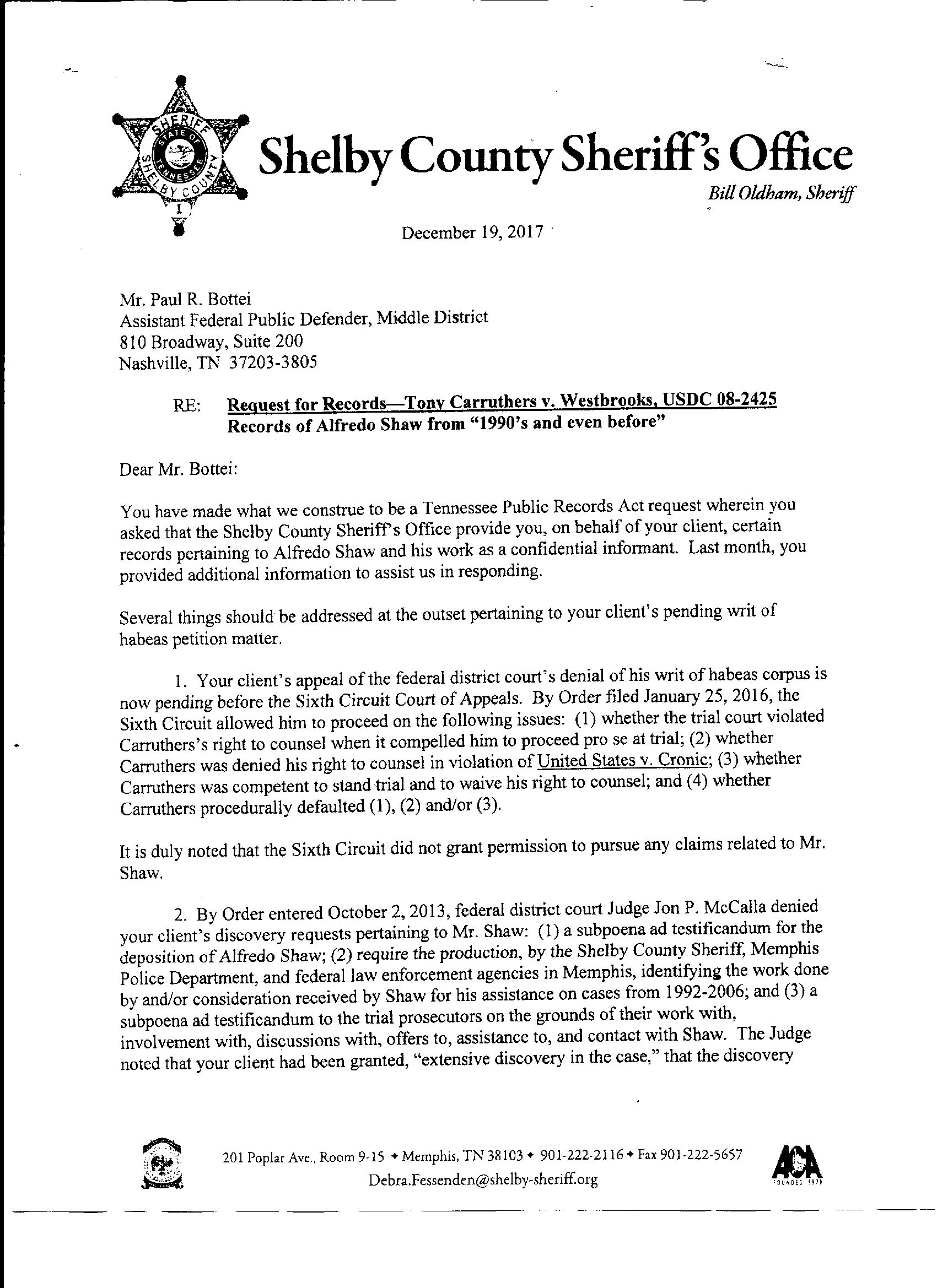

Moreover, Story said, the confidential informant had a criminal history and was a fugitive from the law in 1996, of which he said the district attorney general’s office and Shelby County Sheriff’s Office were aware at the time.
We asked Story if the revelation about Shaw could affect Carruthers’s case, Story responded, “At the time, Carruthers did not know that Shaw was a harbored fugitive; they don’t want that out. Carruthers is on death row for a triple murder. Why would they use a confidential informant, allowing him to steal cars and other crimes and then testify against people at the same time?”
According to the letter, the transaction log involving the confidential informant shows that Shaw conducted undercover drug operations on January 21 and 23, 1997, but not on January 22, 1997, the date cited as Story’s selling of marijuana to Shaw for $850.
“Tony mailed it to me concerning the money transactions that Shelby County Sheriff department paid CI Alfredo Shaw,” Story wrote in the email to which the documents were attached. “My conviction date 1/22/1997 is not present. The $850.00 that I was convicted for receiving is not on the form! This crucial evidence evidence was withheld from me for two decades and it was always in the possession of the Shelby County District Attorney general’s office!”

In notes about his arrest and conviction saved with the above documentation, Story wrote:

On October 29, 2018, Story submitted a Writ of Coram Nobis and Request for Expedited Hearing to the Shelby County Criminal Court, Division III, as a result of the documentation he received from Carruthers.
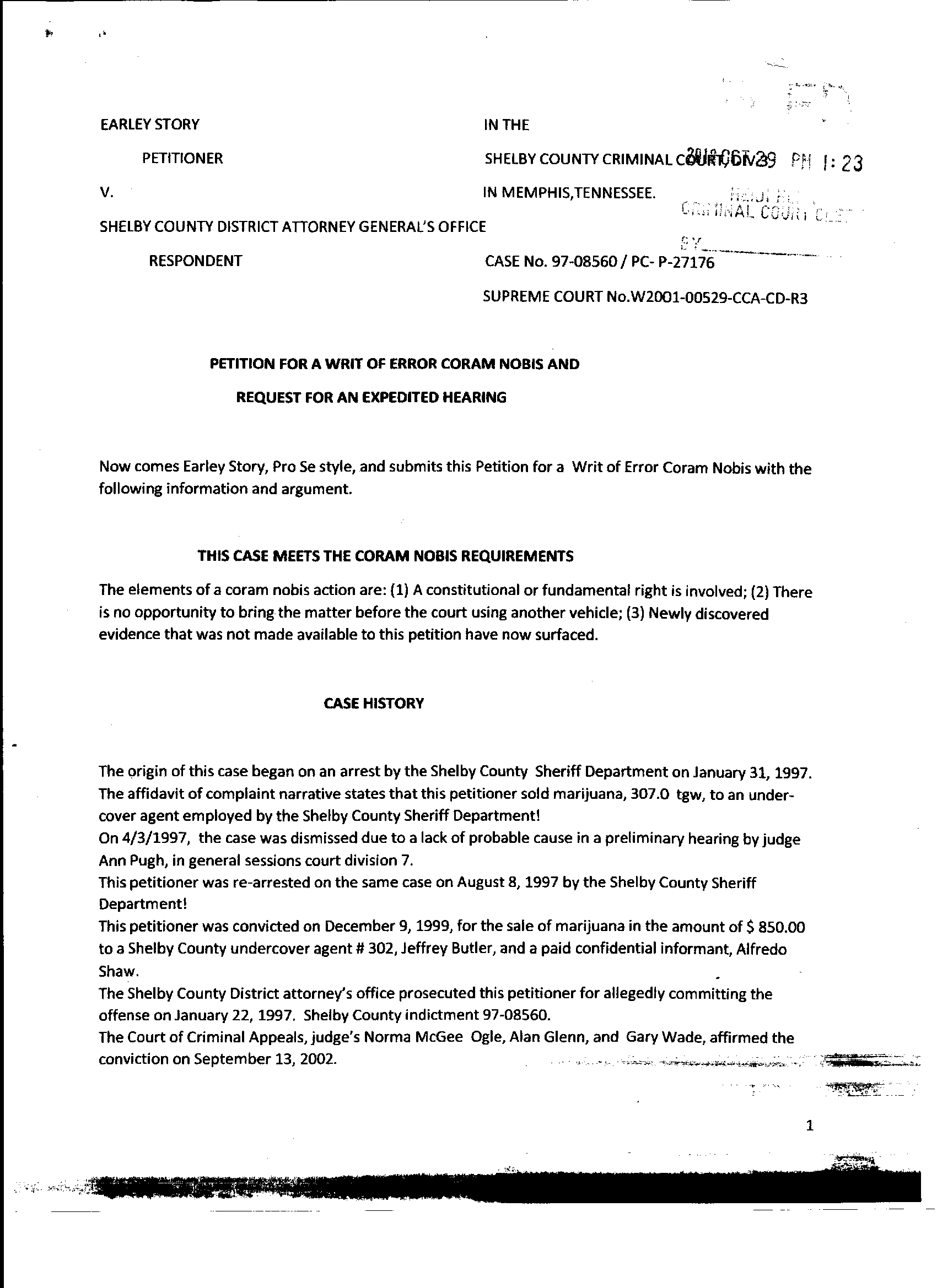
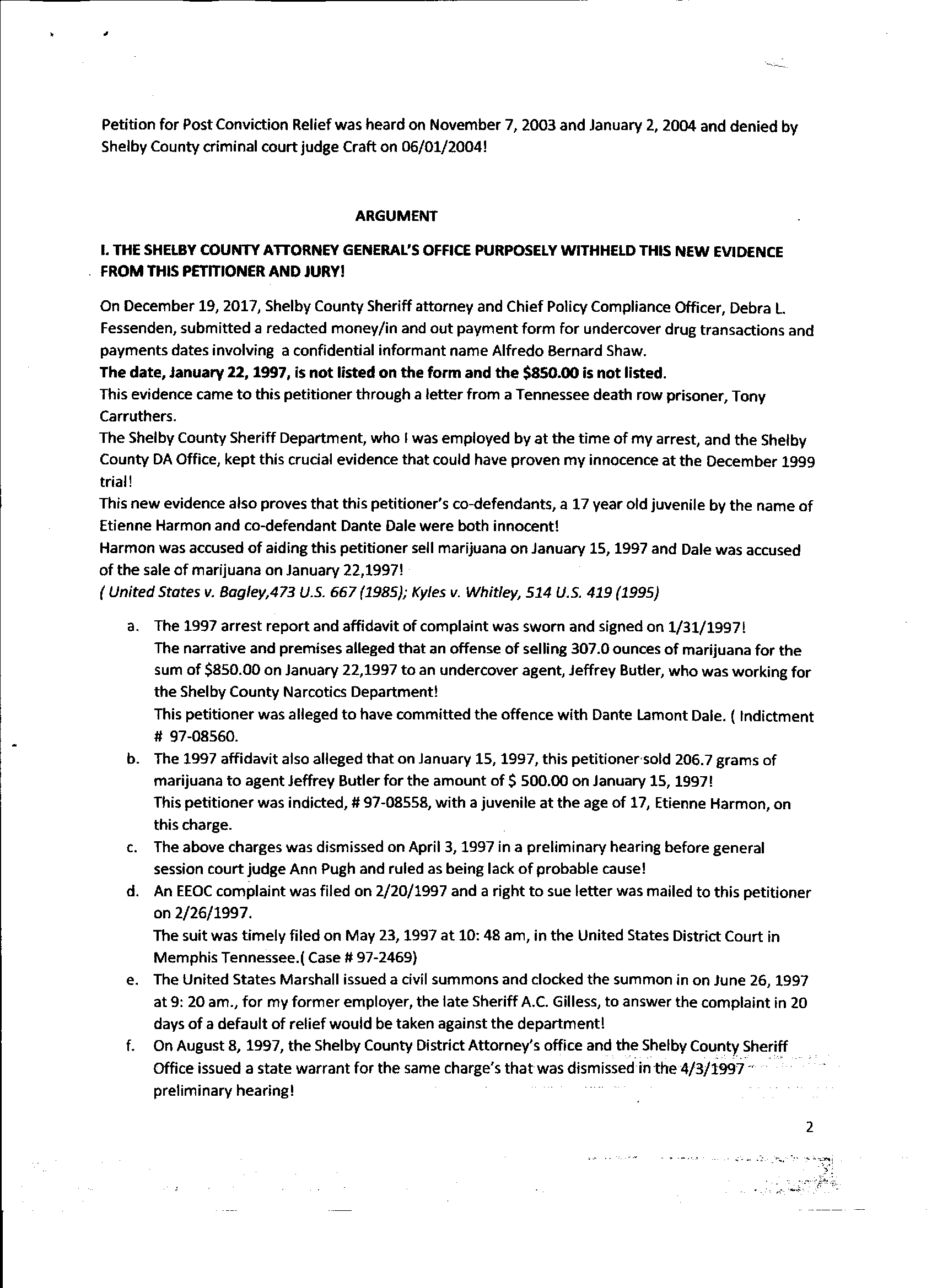

Earlier this month, Story received a letter dated January 14, 2019 from Division VIII of the Criminal Court ordering him to appear for a hearing on February 11 in Division VIII or face arrest. The Post & Email has redacted Story’s address.
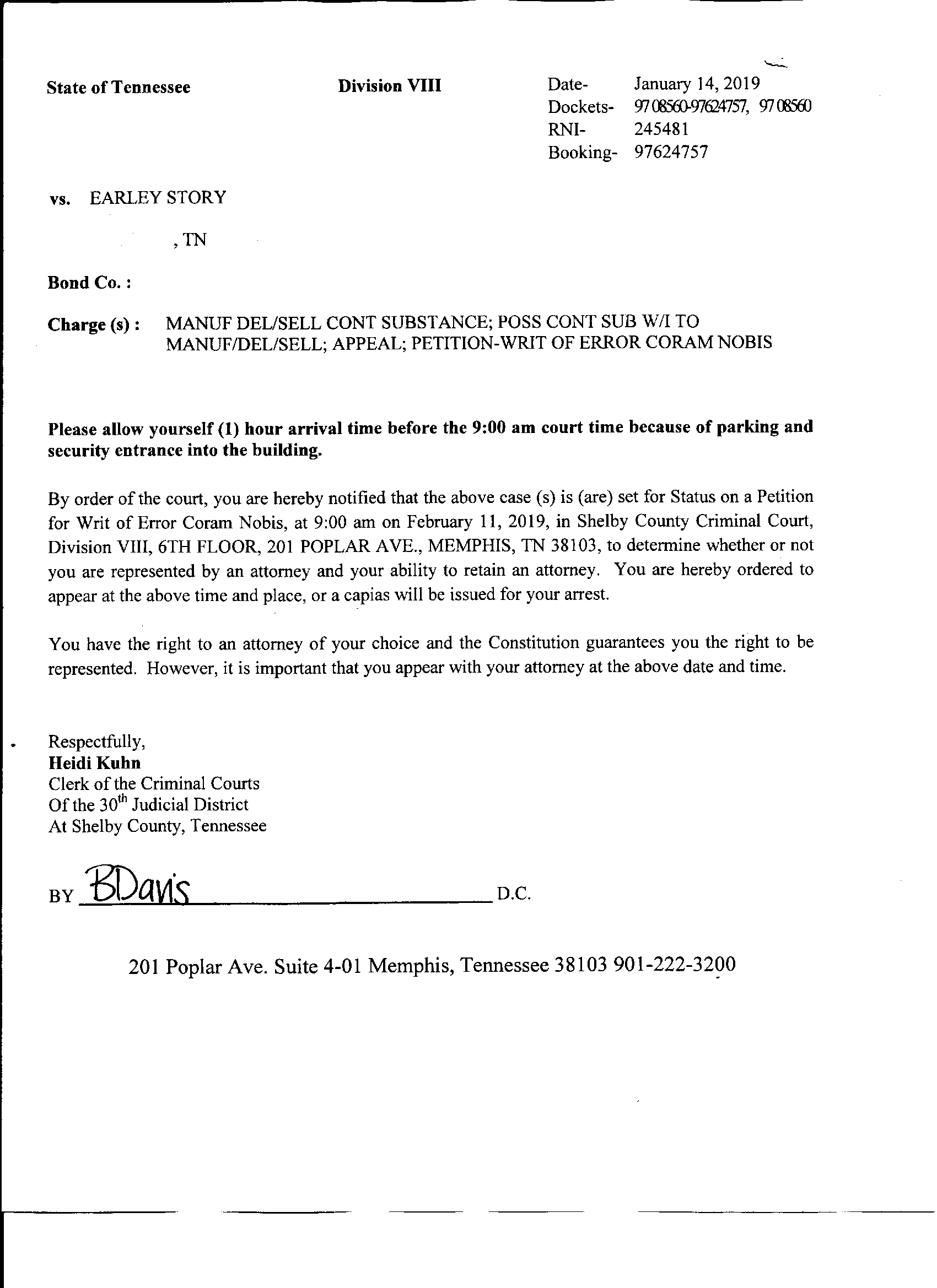
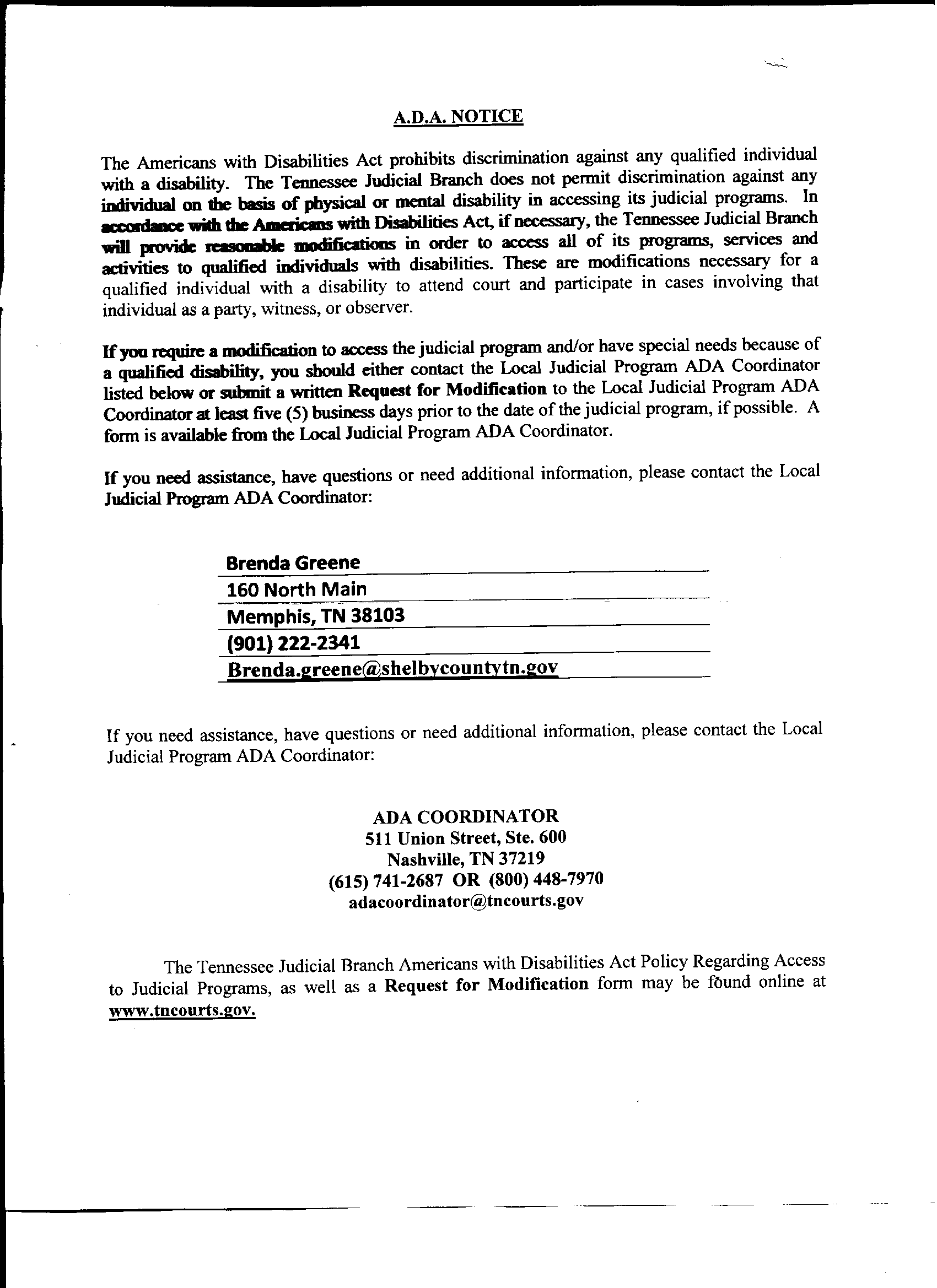
According to Story, the judge who presides over Division VIII cases, Chris Craft, is the same judge who was responsible for “placing Carruthers on death row” and who denied his own post-conviction appeal in 2004. “The same CI, Alfredo Shaw, gave false testimony against Harmon, Carruthers and myself,” Story added, referring to the juvenile charged for selling marijuana at the same time.
That juvenile, Etienne Harmon, turned up dead, Story told us in November.
“Chris Craft was a former district attorney general,” Story told us on Tuesday. “When you run my name in the computer, you find it in Division III, but the letter tells me to report to Division VIII. My last activity in the case was before Chris Craft in 2004.”
The divisions are found on different floors of the courthouse at 201 Poplar Avenue in Memphis, Story said.
On Wednesday, this reporter contacted the Shelby County Criminal Court to inquire as to why Story received a letter mandating his appearance as if for a criminal proceeding when he had requested a hearing based on a Writ of Coram Nobis. The clerk to whom we were eventually connected, Sandra, offered to look into the matter.
We also asked why Story’s hearing would be held in Division VIII rather than Division III, where his 1997 case was heard at trial.
Several hours later, Sandra returned our call and said that the reference to a “capias” being issued if Story were to fail to show was made in error, as it came from a standard template and the issuing clerk neglected to remove the wording. When we asked Sandra if a new letter would be generated without the “capias” reference, she said, “We can send him a new letter.”
Regarding the assignment of the hearing to Craft in Division VIII, Sandra said, “If his original case was in Division VIII, that’s why it’s in Division VIII.” However, she noted that some activity relating to Story was recorded as having occurred in Division III.
When we asked Story on Tuesday what he expected on February 11, he said:
I already know what I’m up against. I’m in the South. Shelby County has one of the biggest black populations in the entire country. They’re used to doing something a certain way to certain people; that’s just the bottom line. You have lawyers here who are very intimidated. You might have a mountain of evidence that proves your innocence, but that don’t matter; their job is on the line. The district attorney general runs the state; the lawyers will just not fight for the citizens of Shelby County. It’s not like Connecticut.


I will stand with Sgt. Story. I worked with him in both the City Jail and also the County Jail in my Opinion He was a Person who was dedicated and loved his assign job duties. I being in a detention officer and Deputy Jailer right beside Story He was a dedicated to his job. And did his assign job to the up most. The only time Sgt. Story did was loved his job. As most of us did back in the days. I stand with Sgt. Story and believe he was SET UP for some reason. I don’t know.